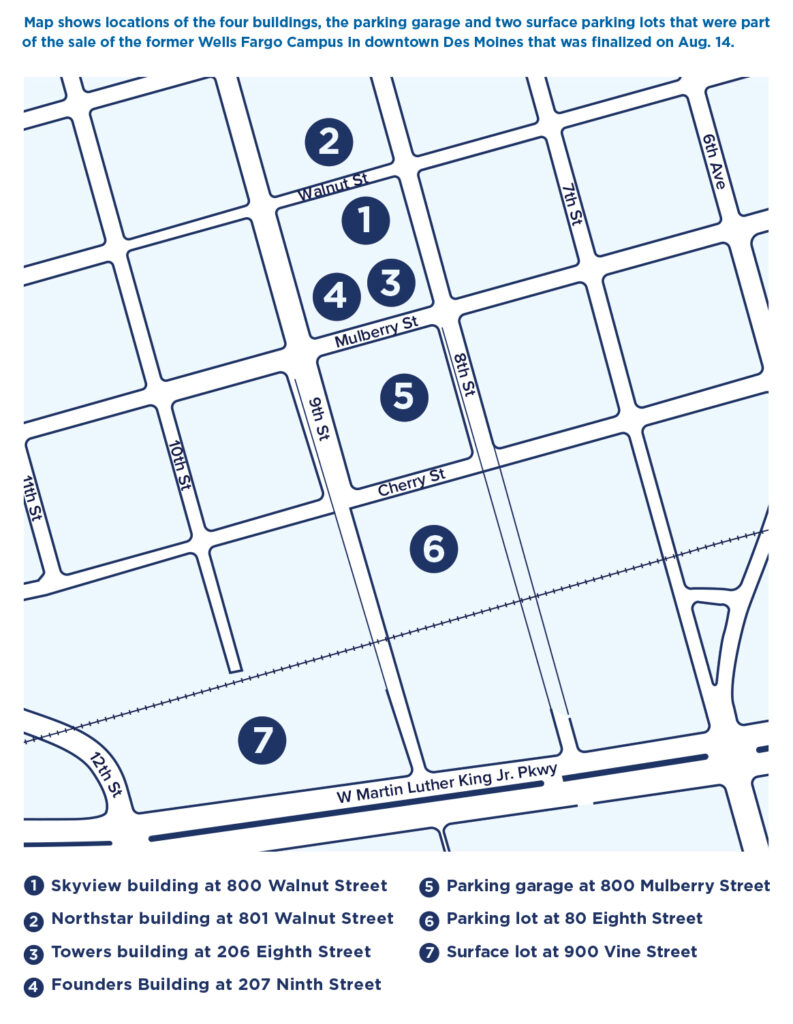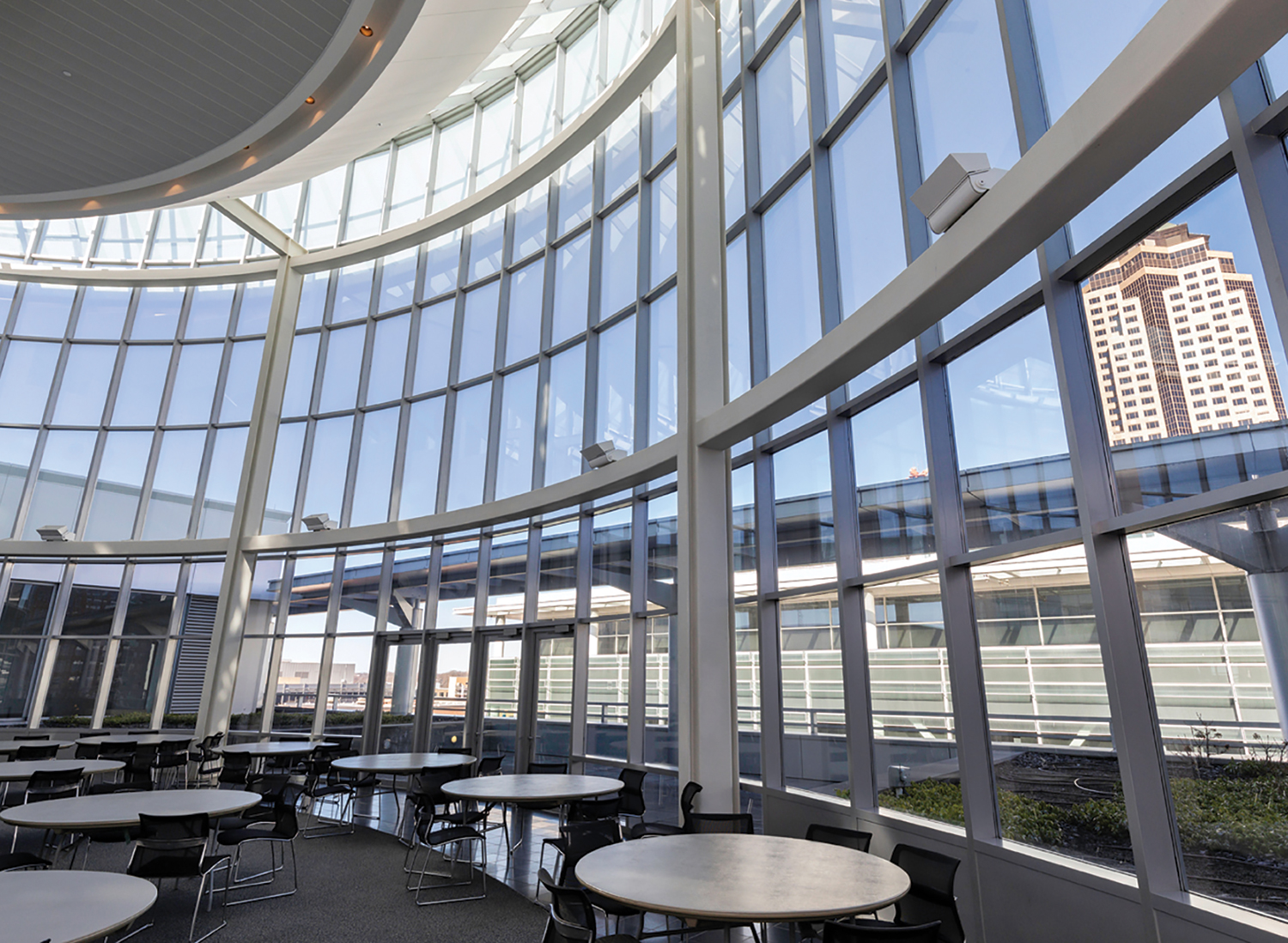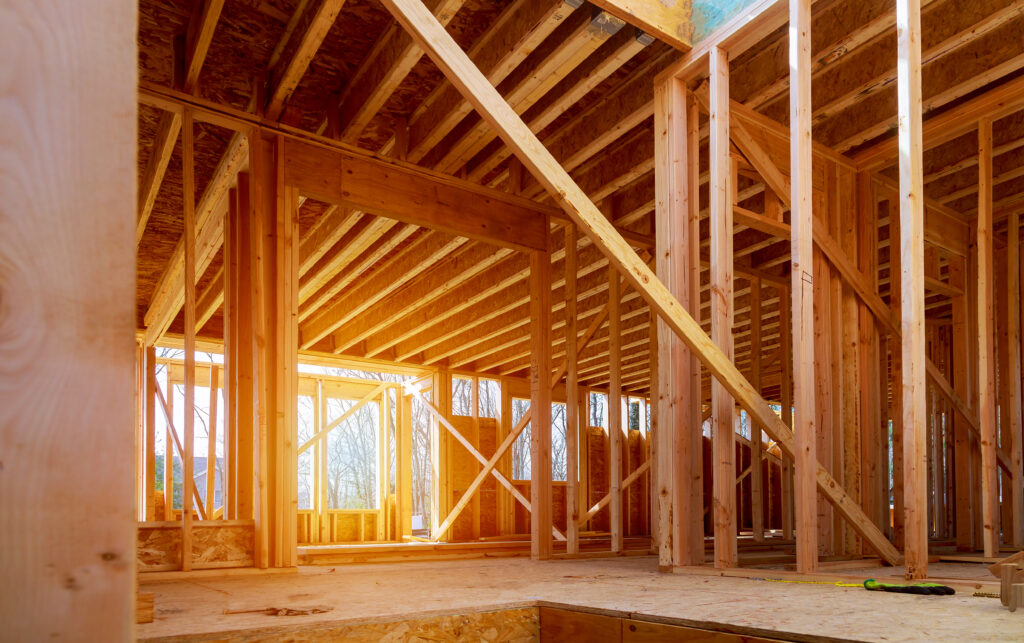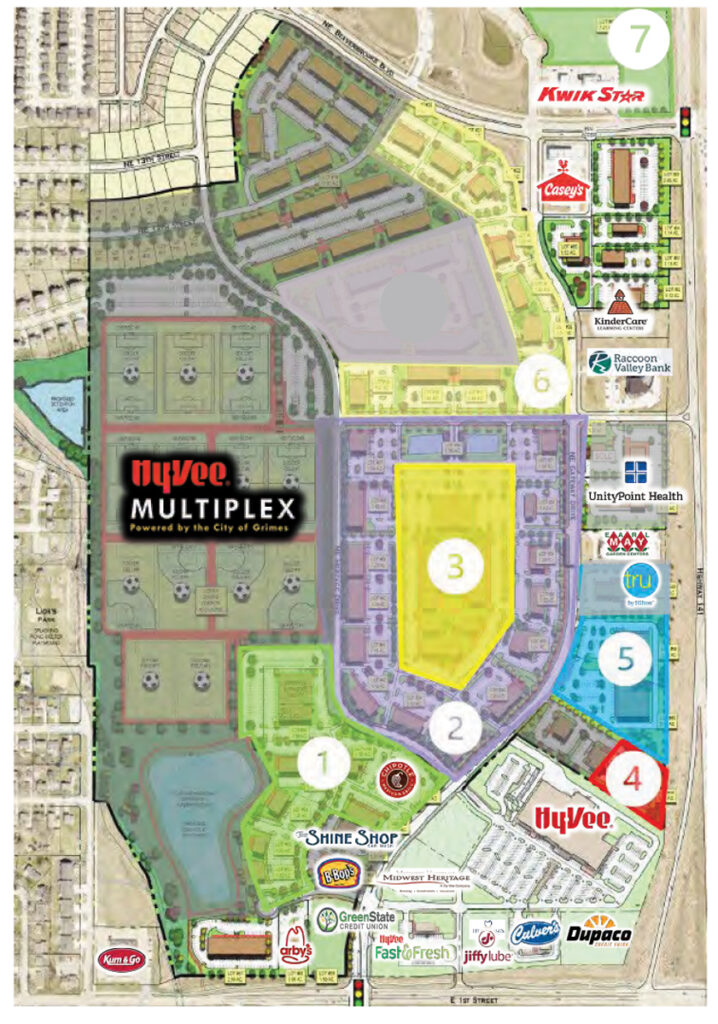Creating opportunity
Leaders say sale of Wells Fargo campus paves way for greater connection downtown

Michael Crumb Aug 29, 2025 | 6:00 am
8 min read time
1,893 wordsBusiness Record Insider, Real Estate and DevelopmentThe sale of the former Wells Fargo properties downtown earlier this month will be a catalyst for more development, enhancing the district’s walkability and help connect the Central Business District to growth that is happening to the south and west, business leaders said.
It will also help boost weekday traffic for downtown restaurants, one business owner said following the sale.
While there is anticipation of how at least two of the buildings could be repurposed, there is also a growing sense of excitement over two surface parking lots that were included in the deal and what development opportunities they hold.

“I think those opportunities are unique because it’s less redevelopment and more just true development of what could come,” said Renae Mauk, vice president of downtown development at the Greater Des Moines Partnership. “A lot of times with our downtown properties, with redevelopment, you’re tackling challenges, such as updating historical infrastructure or trying to add new systems and fit something to what an existing structure already offers.”

Carrie Kruse, economic development administrator for the city of Des Moines, said the sale of the properties clears up the uncertainty that surrounded their future.
“It’s really exciting to see a group come forward to re-vision that campus as a whole,” she said. “We kind of wondered if it would end up needing to be broken up and sold to various owners, which if you want to have a new vision for a large area like this it’s nice to have a single group you can work with to do some placemaking work with the entire campus.”
Like Mauk, Kruse said the former Wells Fargo campus is “an integral connection between the core downtown to the soccer stadium district and all the development happening down there.”
Iowa holdings company DMCRE1 LLC purchased the four buildings for $32 million, and took out a $19.5 million mortgage with Bankers Trust Co., the Polk County Recorder’s Office website shows. The purchase price is below the total assessed value of more than $56.2 million for all the properties, the Polk County Assessor’s website shows.
The Skyview building at 800 Walnut St., the Northstar building at 801 Walnut St., the Towers building at 206 Eighth St., and the Founders Building at 207 Ninth St., all from Wells Fargo, were all included in the transaction.
The deal also included the 545,000-square-foot, 1,600-stall parking garage at 800 Mulberry St., a 1.8-acre surface parking lot at 80 Eighth St. and a 3.27-acre surface lot at 900 Vine St.

In all, more than 1.4 million square feet changed hands in the deal that was finalized on Aug. 14 in what Justin Lossner of JLL, a broker who worked on the sale, said was one of the largest non-industrial transactions in terms of square footage in the metro’s history.
Another entity, DMCRE2 LLC, a collaborative real estate team that includes local developers Jonathan Koester and Michael Stessman, is also involved in the transaction.
According to the Iowa secretary of state’s website, DMCRE1 is registered in Iowa but it is headquartered in Grand Island, Neb., where it maintains its billing and notification address. DMCRE2 is a registered company that is headquartered in Iowa, the secretary of state website shows.
Wells Fargo announced in January 2023 that it was relocating most of its downtown workers to the company’s Jordan Creek campus in West Des Moines. Several weeks later, the company listed its downtown properties for sale.
Wells Fargo has been shedding properties nationally for the past couple of years. It has sold properties in West Des Moines and Clive and did not renew its naming rights deal on the downtown arena now known as Casey’s Center.
Paul Cookson, communications director for Wells Fargo in Charlotte, N.C., wrote in an email that the company declined to comment.
Gordon Glade, a partner in DMCRE1, said he and his associates like the growth that’s happening in Des Moines, citing that as a major factor in the group’s decision to buy the properties.
“We really like the downtown Des Moines area and what’s going on there,” Glade told the Business Record. “There’s a lot of transformation and people moving in.”
The nine-floor Skyview, with its nearly 325,000 square feet of space, was built in 2002. Glade said it could be leased to another office user or sold.
He believes it provides high-level office space that is attractive as companies see more employees return to the office.
“The atrium space on top of Skyview is a very unique view of the city, and has a good feeling that we feel is needed in Des Moines,” Glade said. The building also features a theater.
Events will likely be scheduled for this fall to showcase the building to the community and prospective companies or developers, Glade said.
He also said the parking lots are a great opportunity for new development, saying they could be multifamily and mixed-use.
“There’s good opportunities for development along MLK and studies have shown us good traffic and then you start adding what the next five to 10 years look like for that part of Des Moines, it’s a good area for development to be in,” Glade said.
“You have the soccer stadium project that’s kicking off across the street, down a little bit on MLK, you have quite a bit of development on the other side of MLK, so those things are intriguing to us for future development,” he said. “It’s kind of a nice triangulation between what’s going on with the soccer stadium, the baseball park and the river redistricting that’s going on.”
The 11-story, 188,000-square-foot Towers building was built in 1988. It could be converted into a hotel with a rooftop restaurant, according to a pre-application document filed with the city of Des Moines.
The three-story, nearly 54,000-square-foot Founders Building was built in 1910, and could be converted into meeting and office space with a wellness center and spa, and ground-level parking, the documents, filed in April, show.
Glade said a data center that was built for Wells Fargo in the Founders Building could be recommissioned as part of the redevelopment plan.
“We know the group that built that data center [and] there’s a recommissioning plan that looks very favorable,” he said.
Wells Fargo, which has kept some of its employees in the Northstar Building, will maintain its presence in the 10-story, 298,000-square-foot building, which has an assessed value of nearly $36.7 million, the assessor’s website shows.
Kruse said the Skyview building will help meet the demand for Class A office space downtown.
She’s also excited about the plans that have been outlined for the Towers and Founders buildings, but it’s the surface parking lots that could hold the most potential for connecting downtown to development along the MLK corridor.
“It’s an exciting opportunity to fill a gap with those surface parking lots,” she said. “We’ve talked about those surface parking lots on the south side of the core for a long time, and having a new owner who’s going to be interested in developing those and not reserving them for parking in the future, that’s really exciting.”
The lots are zoned downtown mixed-use, which requires a minimum of three stories and a maximum of eight.
“A lot of what we’ve seen along the MLK corridor has been upper story residential, ground floor commercial, retail, some dining, and I think we’ll probably see that mimicked along that side of MLK,” she said.
The smaller parking lot on Eighth Street could be more challenging because of the viaducts that run along both sides of it, Kruse said.
“That one will be kind of interesting to strategize on and figure out what the best development solution is for that site given the obstacle of those two viaducts,” she said.
Kruse said DMCRE1 has already done a lot of due diligence on the Founders and Towers buildings, which gives them a head start on redeveloping those properties, and that work on those could begin much sooner than the parking lots.
“There’s a lot of planning, visioning, lining up financial sources, and in the current environment development is very costly,” she said, citing high costs of construction and high interest rates. “It takes a long time to piece everything together to make new construction occur, so I would expect that to take a year or longer to really get those plans in place.”
She said the Mulberry Street parking garage being part of the sale could be a selling point in the redevelopment of the parking lots.
Mauk said there has been a lot of talk in the DSM Future Forward Vision Plan about development of surface parking lots because they are “ripe for opportunity.”
“That really helps build the density and additional destinations for folks downtown, residents, employees and visitors,” she said. “We talk a lot about the walkability of downtown and anything we can do to fill those areas and add those amenities you might find in other cities, it will just make downtown feel much more connected.”
The sale of the Wells Fargo campus is just the latest in what Mauk described as growing activity downtown. She cited the move by the city and American Equity Investment Life Insurance Co. into the former Nationwide building on Locust Street, the redevelopment of the former courthouse annex building, now called the Riverview building, and the continued development of the Market District, as examples of the growth happening downtown.
“There’s so much good happening downtown,” she said. “It’s joining the long list of things that are going on downtown.”

Chris Diebel, owner of downtown restaurant Bubba, 200 10th St., said the redevelopment of the former Wells Fargo campus should boost downtown traffic for restaurants in the area.
“While demand for nights and weekends has increased since the pandemic, daytime business remains slow,” Diebel wrote in an email. “Remote work and flex hours continue to plague downtown restaurants. Anything that will drive daytime and mid-week demand is welcome, especially in the Western Gateway.”
Diebel wrote that hotels are a great addition because they attract mid-week business travelers who tend to dine out for most of their meals.
“Having a robust mix of residential, commercial, office and retail ensures a successful downtown ecosystem,” he said. “That balance has been off-kilter for the last five years. Hopefully, we’ll continue to see the neighborhood heal as projects like this come online.”
Glade said his group is realistic about the projects it undertakes.
“I wouldn’t say we’re grand vision people,” he said. “It’s finding good businesses and investing in them. Real estate is a business in and of itself, and when you get into office space, this has the unique ability to have development.
“The office [sector] for us has been beat up in certain areas for the last few years,” Glade said. “We like the trend of people moving away from the Chicagos and St. Louises of the world. You look at the foot growth trends of Des Moines and trends in Iowa, where do you want to raise a family and bring your employees to have a good quality of life? If there’s an empty building in Chicago, there’s a lot of them and we’re not investing there because we don’t see the next five- to 10-year trend of population growth and business growth that we see in Des Moines or in Omaha.”

Michael Crumb
Michael Crumb is a senior staff writer at Business Record. He covers real estate and development and transportation.










